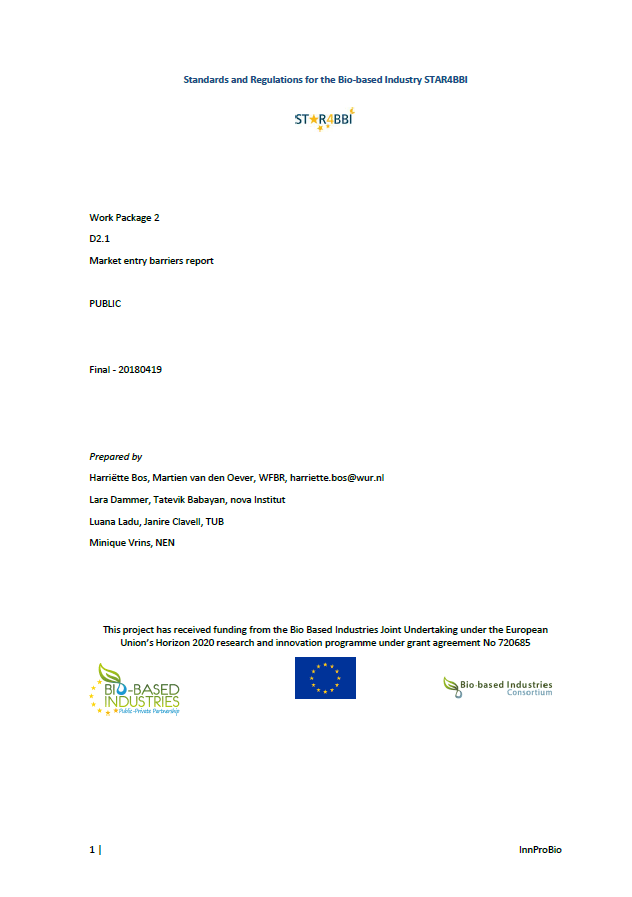This report describes the market entry barriers due to regulation and standardisation that companies that are active in the bio-based economy experience. The analysis is based on extensive interviews with seven companies that were held mostly in 2017.
The companies that were interviewed were selected on the basis of a good spread of their respective positions in the value chain and over different feedstock. Next to the companies, in some cases other relevant stakeholders were approached for clarifying background or issues, especially when different views and standpoints were encountered during the interviews.
All hurdles that were mentioned during the interviews were grouped under five main themes and are described extensively in this report. The five themes are:
- End-of-Life, where a number of hurdles are present, including the fact that there is no general agreement as to which end-of-life option (recycling, digestion, composting, incineration, landfilling) for a given bio-based product is the most preferable. Furthermore there are conflicting interests between bioplastics/bioproduct producers and waste processing companies/recyclers. Furthermore, there is a lot of confusion how to dispose of biodegradable or bio-based products: f.i. different municipalities in one country have different regulations. Also labelling of the products is often a hurdle: among others existing labels are often not clearly visible or not used, different labels exist for the same message, or there are similar labels with a completely different meaning.
- Certification and standards. There is a need for certification in the bio-based market to inform on characteristics of the products and materials. However, over the last years certification schemes have been developed that are similar or overlapping. The large quantity of certification schemes is perceived as a hurdle to further develop the bio-based industry. Additional identified hurdles related to standards are the challenges standardization offers in general, in particular for SMEs; time consuming, costly and the requested level of expertise. Another related identified hurdle within standardization are incorrect statements in standards or missing standards in general.
- Biofuel policy. The RED of 2009 and the RED II proposal are establishing conditions for biomass uses giving higher incentives of biomass use in biofuel and bioenergy sectors. Presently, there is no supportive legislative mechanism to support and regulate the use of the available biomass for producing materials. As the bio-based materials and bioenergy sectors compete for the same recourses the competition remains unfair for the bio-based materials and products. Another result of biofuel policy is that the use of biomass in the bio economies other than food has received a negative image by the public.
- (Missing) long term policy. For bio-based products, a level playing field is not in place. Externalities by fossil products like damage to the environment are paid by the society as a whole and not by the producer or buyer of the product. This implies that wherever bio-based products may diminish these externalities they cannot benefit since the fossil products do not carry the price disadvantage.
- Communication and image. Bio-based materials are very diverse and differ in terms of structure, processes, feedstocks and applications. So, information regarding sustainability, handling of products, durability and end-of-life options may be complex to experts, and even more so to consumers. Moreover, there is a paradox between consumers wish for detailed information on the one hand and a desire to get simple messages on the other. There is a multitude of schemes available for different aspects of bio-based products, for instance for the biomass feedstock, this further confuses communication. Furthermore it is difficult to have a fact-based and rational discussion on food security in relation to the use of biomass for bio-based products.
The analysis laid down in this report will serve as the basis for proposing solutions to the market entry barriers related to regulation and standardisation that will be one of the main deliverables of the Star4BBI project.

